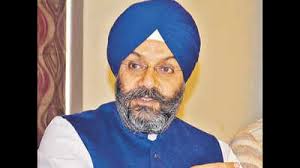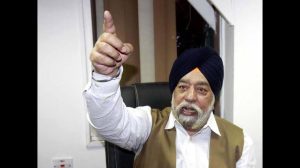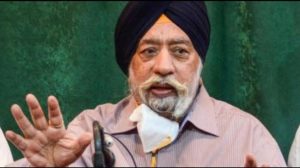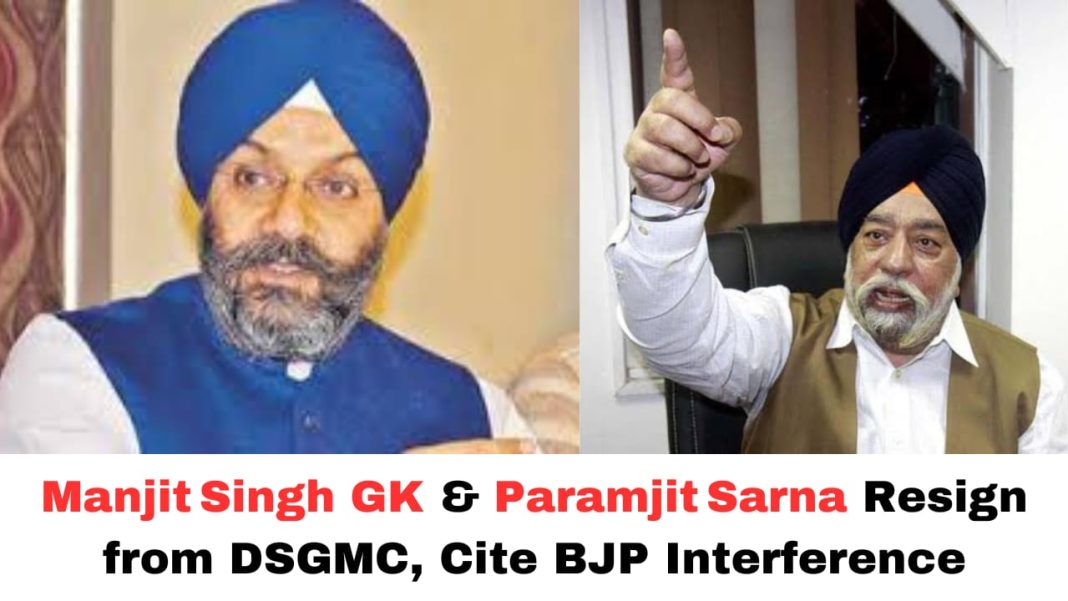Digital News Guru New Delhi Desk:
DSGMC Leaders Resign to Protest Political Interference
Manjit Singh GK and Paramjit Singh Sarna—both former presidents of the Delhi Sikh Gurdwara Management Committee (DSGMC)—submitted their resignations directly to Prime Minister Narendra Modi, bypassing the current DSGMC president Harmeet Singh Kalka. This dramatic move was intended to draw national attention to their protest.
Reason behind the resignations:
GK and Sarna accused the BJP-led Delhi government under CM Rekha Gupta of orchestrating a systematic “top-down political assault” to influence Sikh religious institutions and suppress the internal democratic processes of the DSGMC. They warn that this blueprint of interference has been unfolding in BJP-controlled states since 2021.

Historical Significance and Allegations
Expansion of BJP Influence
Paramjit Singh Sarna, who previously headed DSGMC, alleged the interference is part of a broader BJP blueprint: a deliberate takeover of Sikh institutions by BJP-run state governments since 2021—now manifesting within Delhi’s gurdwaras, from historic shrines to Sikh sabhas.
Reference to Legacy of Respect
In their resignation note, GK and Sarna evoke the memory of earlier administrations: praising the respect for institutional autonomy shown under PM Atal Bihari Vajpayee and Delhi CM Madan Lal Khurana (1999–2004), contrasting it with what they portray as a current erosion of religious sanctity.
Electoral Backdrop
Election Controversies
Their assertion comes on the heels of heightened tensions over DSGMC’s biennial elections, scheduled for June 25. Ahead of polls, Harmeet Singh Kalka emphasized fairness and transparency, warning against disruptions, while accusing Sarna and GK of hypocrisy—alleging they sought election delays, yet now pursue court stoppages.
Sarna, in turn, argued that the election timing violated the DSGMC Act and epitomized growing government overreach.
Dissent Within the Community
Their direct appeal to PM Modi has sparked criticism from within the Sikh leadership:
- Inder Mohan Singh, a former DSGMC member, accused them of setting a troubling precedent: by sidelining the DSGMC presidency, they turned an internal issue into a political spectacle.
- A recent statement from current DSGMC sources urged Sarna–GK to refrain from making “false allegations” and to respect internal grievance forums.

Broader Implications
Religious Autonomy at Stake
The resignations underscore a growing anxiety among Sikh leaders that political actors are encroaching on decisions of religious importance—operations of gurdwaras, schools, hospitals, and welfare homes, all overseen by DSGMC . The long-term fear: governments may not only direct who sits at the leadership table but also dictate policy in Sikh religious life.
BJP’s Political Strategy
Sarna’s claim of a “blueprint” raises questions about the BJP’s broader strategy. The party, meanwhile, portrays its involvement as “engagement,” not infiltration—though critics see a pattern dating back to earlier takeovers of Sikh religious bodies in Punjab and Maharashtra.
The Timing Coincides with Lok Sabha Preparations
With the general elections around the corner, this episode could throw a spotlight on the BJP’s relationships with religious minorities. The protest comes at a time when the party is attempting to project stronger outreach to Sikh communities, symbolically and politically .
A Brief on DSGMC: History and Structure
Established under the Delhi Sikh Gurdwaras Act of 1971, DSGMC is a key institution for Delhi’s Sikhs, overseeing 55 elected bodies and nine co-opted members, and managing everything from iconic gurdwaras to schools and old-age homes. It is akin to SGPC—the Sikh counterpart in Punjab and Haryana—but operates under Delhi-specific governance. Every four years, its executive body is elected under Delhi government supervision.
What’s Next
- Election day verdict: The results could break or reinforce the political deadlock. A victory for Kalka may endorse the status quo; a strong push for GK/Sarna could suggest a mandate against perceived interference.
- Legal implications: Parliamentary petitions, judicial scrutiny under the 1971 Act, and possible federal oversight may follow.
- Public mobilization: Sikh institutions across India, including SGPC in Punjab and HSGPC in Haryana, may weigh in, either in solidarity or by cautioning restraint.

Conclusion
The resignations of Manjit Singh GK and Paramjit Singh Sarna mark more than just a protest—this moment signals a sprouting conflict at the intersection of religion, politics, and power. Are these resignations a principled stand to protect Sikh institutional autonomy—or a political maneuver seeking attention amid electoral turbulence?
The coming days will determine whether this controversy sparks genuine dialogue and reform, or deepens rifts within Delhi’s Sikh governance. One thing is clear: this is no ordinary internal squabble—it’s emblematic of a broader reckoning over who gets to shape the future of Sikh participation in India’s democratic republic.
You May Also Read: Lok Sabha Speaker Om Birla: “parliamentary committees act as supportive, corrective instruments, not oppose the government”








